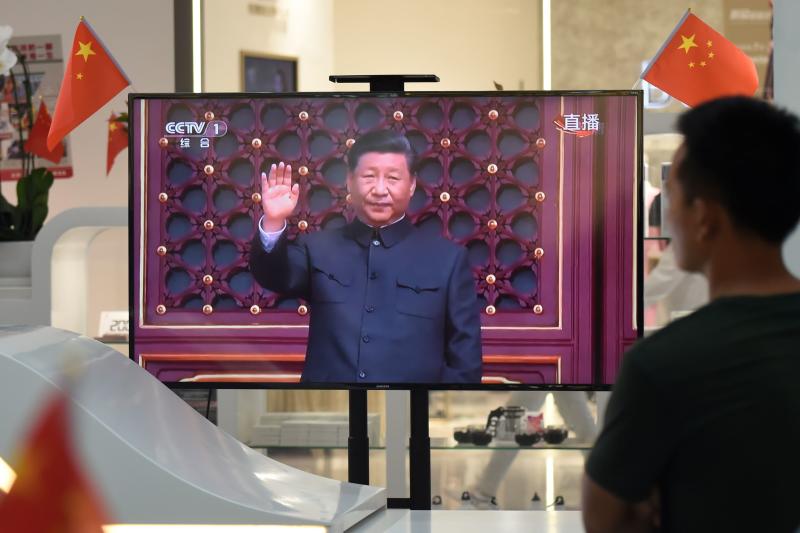Perceptions of China have turned largely negative, Asia-Pacific countries more wary of its rise: Survey
Sign up now: Get ST's newsletters delivered to your inbox

A photo taken on Oct 1, 2019, shows a repeat broadcast of a military parade at Tiananmen Square, to mark the 70th anniversary of the founding of the People's Republic of China, at a mall in Beijing.
PHOTO: AFP
Global views of China are mixed, with the country's economic rise generally welcomed, but its growing military might eliciting a tinge of wariness.
But in the Asia-Pacific, the perception of China has turned significantly negative in recent years, according to non-partisan American "fact tank" Pew Research's latest report on global attitudes towards China, based on a survey across 34 countries.
Even investment from China is increasingly seen as a potential liability in the Asia-Pacific, whose people believe it gives Beijing too much influence over their economies. Views of Chinese President Xi Jinping are also largely negative.
Pew's global attitude survey focusing on China's economic growth interviewed 38,426 people from May 13 to Oct 2 this year. Australia, Indonesia, South Korea, the Philippines, India and Japan were the six Asia-Pacific countries covered.
And in what amounts to a reservoir of goodwill for the United States, these Asia-Pacific countries were more likely than others to see the United States' economic influence in their country positively.
The United States was named the top economic power in 21 of the 34 countries surveyed, while China was considered the top economy in 12. It was a tie between both in Lebanon.
In terms of alliances, the report found that many more name the US as the top country their nation can rely on, rather than China.
In fact, China was named as a top threat in the Asia-Pacific - by 40 per cent of Australians, 50 per cent of Japanese and 62 per cent of Filipinos.
Countries in the Asia-Pacific "tend to be least likely to say that China's growing military is good for their countries", Dr Laura Silver, a senior researcher at Pew Research Center who co-authored the report, told The Straits Times.
Perceptions of China in the Asia-Pacific have dipped considerably since 2002.
"Very few globally believe that China's growing military is good, but those countries also stand out for the degree to which they perceive threats from China and emphasis they place on their alliance with the United States," Dr Silver added.
Relative divisions remain even in countries that view its investment with slightly more suspicion, she noted.
"Across the region we see 31 per cent of people say that investment from China is good because it creates jobs to their countries, while 68 per cent say it is bad because it gives China too much influence. So the (Asia-Pacific) region does stand out for its relative scepticism," she said.
But views often reflected geography and politics. In the United States for instance, Republicans or people who lean Republican are much more likely to name China as the country perceived as the biggest threat, while Democrats or people who lean Democrat are much more likely to name Russia.
Generally, most non-European countries see the United States as the world's leading economic power, while those in Europe tend to name China, the report said.
Across many Latin American as well as Middle East and North African countries surveyed, more named the US as a top threat rather than China. For instance, when asked which country was their greatest ally, America scored 82 per cent in staunch ally Israel, but just 2 per cent in Turkey and 6 per cent in Tunisia.


